Key takeaways:
- Surveillance laws vary by jurisdiction and balance national security with personal privacy, implicating individual rights in daily life.
- Key historical milestones include the Wiretap Act, the Privacy Act, and the USA PATRIOT Act, each reflecting public response to privacy concerns.
- Core principles of surveillance law encompass oversight, proportionality, and the necessity of informed consent to ensure respect for personal privacy.
- Technological advancements complicate privacy, as devices and social media influence our understanding and control of personal information sharing.
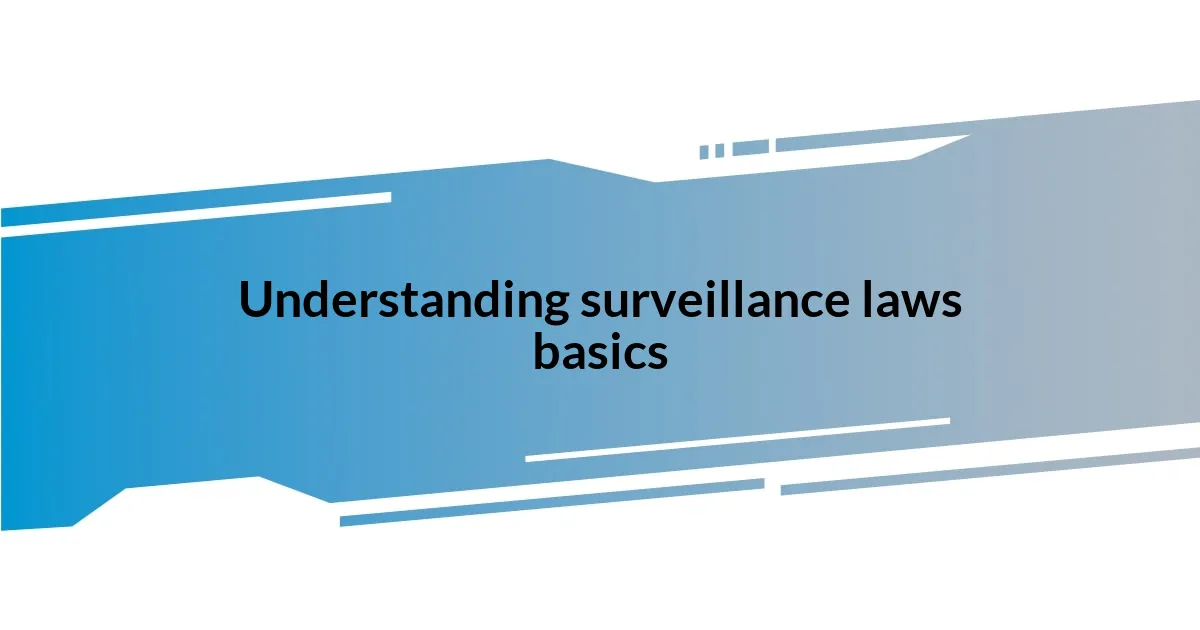
Understanding surveillance laws basics
Surveillance laws are a fascinating and often complex topic that directly impacts our daily lives. When I first delved into this subject, I was surprised to learn how they vary greatly from one jurisdiction to another. Have you ever thought about how the balance of national security and personal privacy plays out in your own life? It’s a delicate dance, and understanding these laws can empower us to know our rights.
One of the key aspects of surveillance laws is the distinction between public and private surveillance. For instance, I remember being out in a city park where I noticed a series of cameras watching over the area. At that moment, I grasped how surveillance is woven into the fabric of our society, often aimed at increasing safety but sometimes brushing against our privacy. It made me wonder: when does safety cross the line into invasion?
Understanding the basics also involves knowing about consent, which can be a grey area. I often reflect on that time when I received a notification from a social media app about location tracking; it prompted me to reconsider how much I willingly share. Are we really aware of what we agree to when we click ‘Accept’? As I explored more, I realized that awareness is the first step to navigating our rights within these intricate laws.
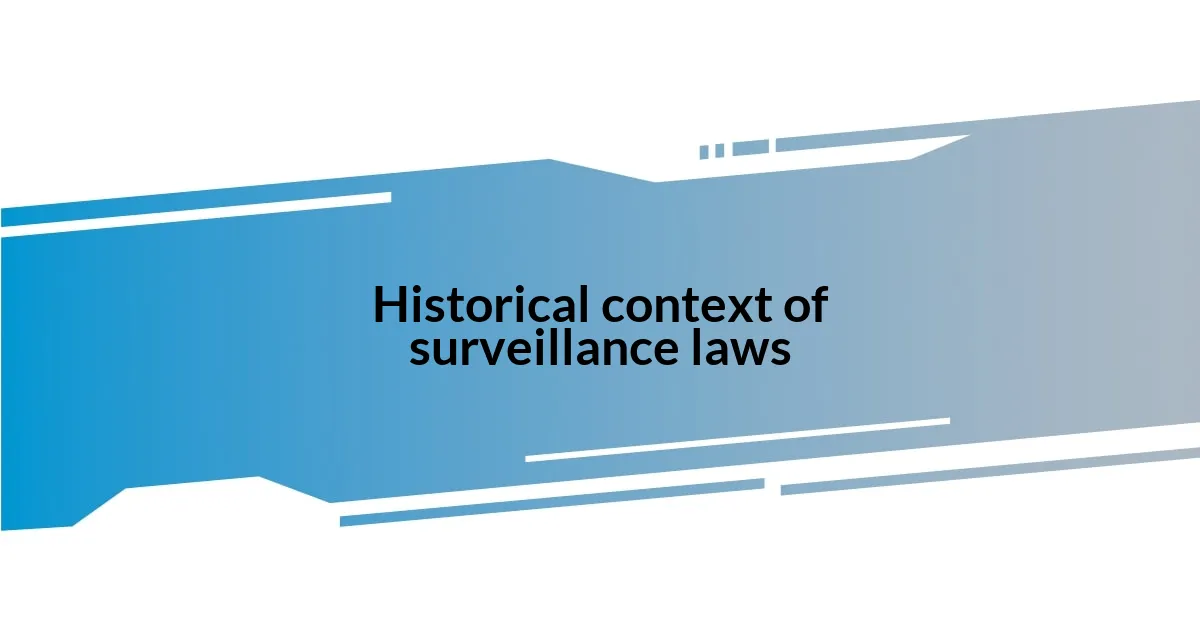
Historical context of surveillance laws
As I explored the historical context of surveillance laws, I discovered that the roots of modern surveillance can be traced back to the late 19th century. Initially, these laws were shaped by the need to address public safety concerns amid rapid urbanization and technological advancements. I remember reading about how the advent of the telephone sparked early fears about privacy. It struck me—were we really ready to embrace technology while our legal frameworks struggled to keep pace?
Key milestones in the evolution of surveillance laws include:
- The Wiretap Act of 1968: This was one of the first federal laws regulating wiretaps and electronic eavesdropping, giving me insight into how citizens demanded legal protection against invasive technologies.
- The Privacy Act of 1974: Established to prevent abuse of personal information by government agencies, it made me reflect on how citizens have historically fought for their privacy rights.
- The USA PATRIOT Act of 2001: Enacted in response to terrorism, this law significantly expanded surveillance powers, and I can recall the widespread debates it sparked about security versus civil liberties.
Each of these moments in history painted a clearer picture of why surveillance laws are constantly evolving. The tension between ensuring safety and protecting individual rights resonates with me on a personal level; I’ve often found myself weighing the need for security against my own desire for privacy.
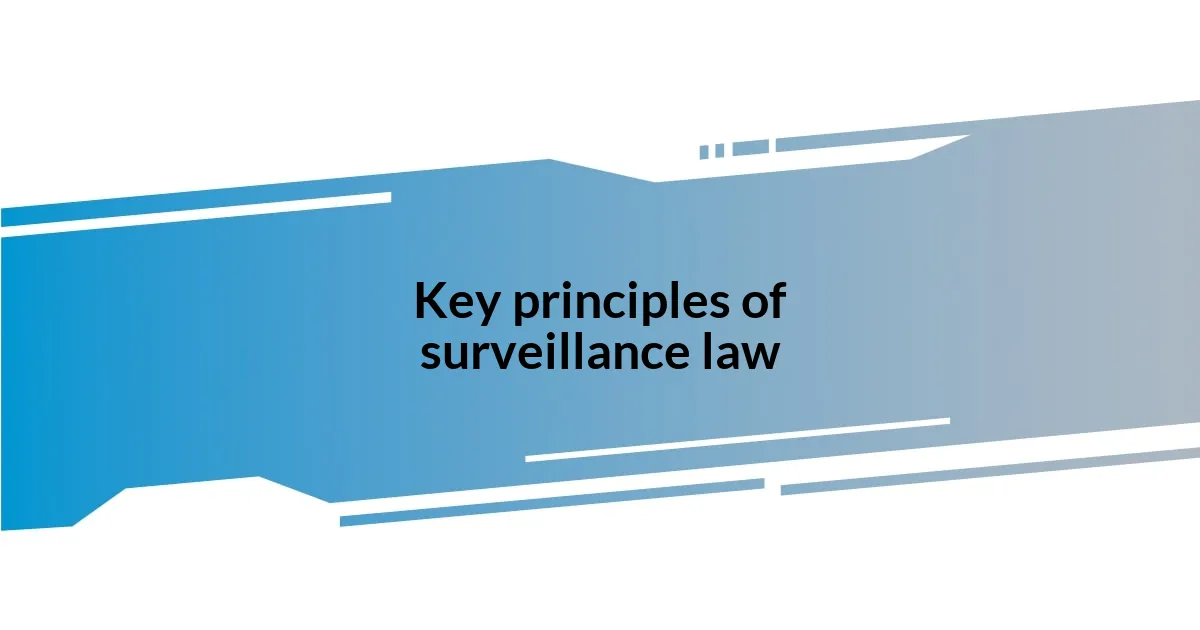
Key principles of surveillance law
Understanding the key principles of surveillance law can feel overwhelming at first, but a few core concepts really stand out. One principle that resonates with me is the necessity of oversight. When I learned about the role of judicial approval in surveillance activities, I immediately thought about the balance of power. Ideally, a warrant should only be issued when there is a demonstrable need for surveillance, allowing for transparency and accountability. It gave me a sense of security knowing there are checks in place to prevent misuse.
Another essential principle is proportionality, which means that any surveillance must be appropriate to the situation at hand. I recall a recent incident where a neighbor’s security camera seemed to capture everything happening on our street. I began questioning the limits of personal surveillance and how it might infringe on others’ privacy. For me, this principle became a touchstone; we must always consider whether the means justify the ends when it comes to invading someone’s personal space.
Lastly, consent remains a critical factor. There was a time when I received an email asking for permission to monitor my online activities. It struck me as a significant moment, sparking thoughts about whether I felt truly empowered in granting that consent. Understanding that consent should be informed and voluntary helps me recognize my agency in these situations. It’s a reminder that personal privacy isn’t just about laws but also about our choices and awareness.
| Principle | Description |
|---|---|
| Oversight | Judicial approval is necessary for surveillance, promoting accountability. |
| Proportionality | Surveillance must be appropriate to the situation, weighing means against ends. |
| Consent | Informed and voluntary consent should be prioritized to respect personal privacy. |
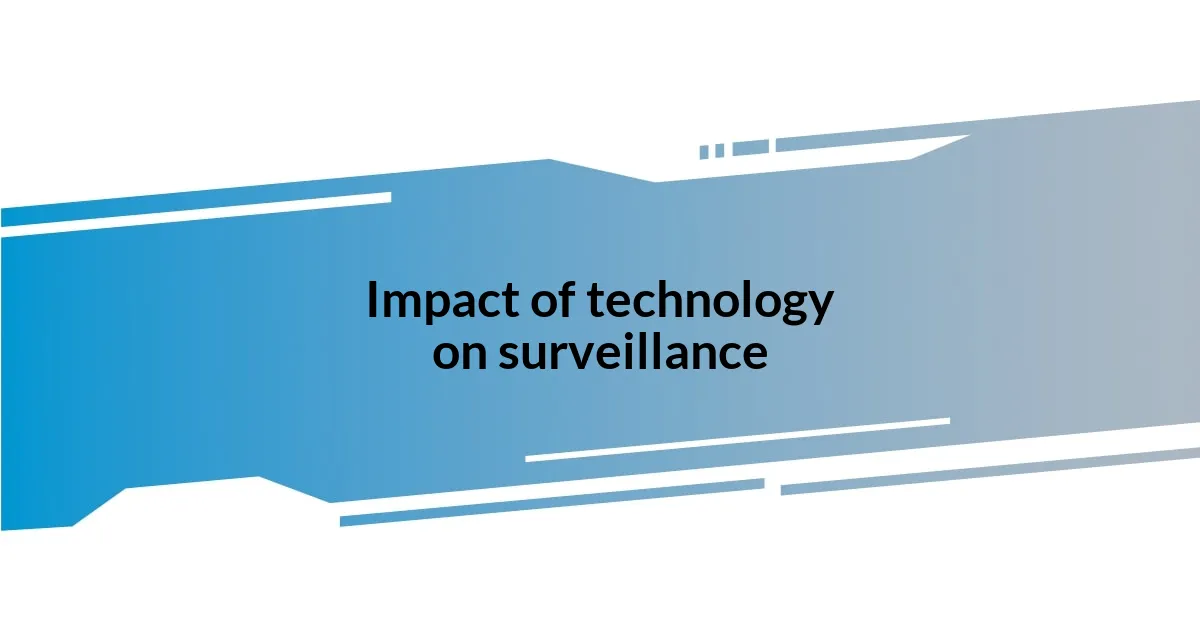
Impact of technology on surveillance
As I delved into the impact of technology on surveillance, I was struck by how rapidly evolving devices have reshaped our understanding of privacy. For instance, take smartphones. They are incredibly convenient but also act as powerful surveillance tools, often tracking our every move. I often ask myself: are we truly aware of the ways our devices collect and share our personal information? That realization hit me hard when I considered how many apps request permissions that seem excessive or unrelated to their intended use.
The rise of the Internet of Things (IoT) has further complicated the landscape. Suddenly, everyday items like thermostats and refrigerators are collecting data about our habits. I remember a friend who installed smart home technology for ease, only to discover later that it was recording more than he anticipated. It raised questions for me about the unknown boundaries of consent—do we really understand what we’re agreeing to when we invite these technologies into our lives?
Moreover, social media platforms have transformed the surveillance game entirely. They not only analyze our behavior but also influence it. I found myself reflecting on how much I share online, often without a second thought. It’s sobering to think about the fine line between connectivity and surveillance, making me wonder—does sharing my life online enhance relationships, or does it invite unwanted scrutiny? The intersection of technology and surveillance continues to challenge my perception of safe boundaries in this digital age.
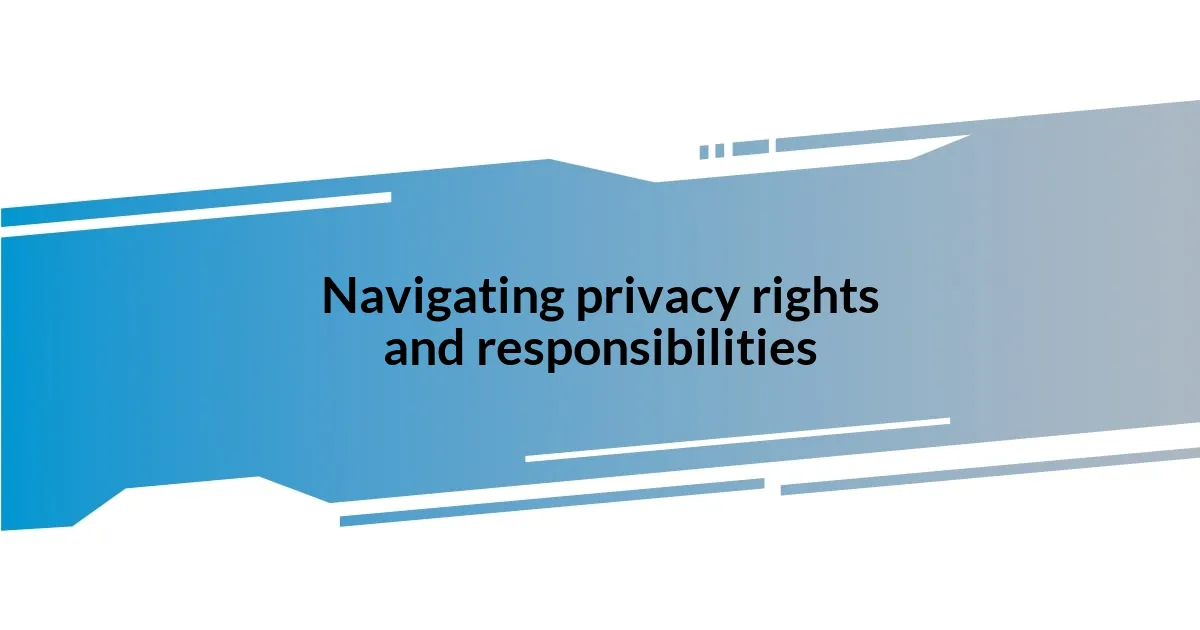
Navigating privacy rights and responsibilities
Navigating privacy rights can sometimes feel like walking a tightrope, balancing personal freedom with societal safety. I often think about my own experiences when I receive those terms and conditions pop-ups online. How many times have I clicked ‘accept’ without truly reading what I was agreeing to? This is where our responsibility comes into play; understanding what we consent to empowers us and protects our privacy.
At the same time, we must be aware of the responsibilities that come with our privacy rights. I remember a time when a friend posted a candid photo of a group outing without checking in to see if everyone was comfortable with it. This sparked a meaningful conversation about consent and respect for others’ privacy, reminding me that it’s not just about protecting my own rights but also being vigilant about the rights of those around me. The question then becomes: how do we ensure that our desire for connection doesn’t compromise someone else’s comfort?
Finally, it’s essential to recognize that knowledge is power in this journey. As I navigated through various privacy laws, I realized that staying informed about changes and implications directly affects my choices. For example, knowing how to adjust privacy settings on social media can significantly alter my online experience. Do I really want my location to be public? By making conscious decisions, I feel a sense of control over my personal space, which is crucial in today’s interconnected world.

Resources for further learning
When it comes to understanding surveillance laws, I’ve found a few key resources to be particularly enlightening. One standout is the Electronic Frontier Foundation (EFF) website. Their articles break down complex legal jargon into language that’s much more accessible, and I remember spending hours there, diving deep into various case studies that illuminated the nuances of privacy rights. This resource has been a game changer for me, simplifying what felt overwhelming at first.
Podcasts can also be a great way to absorb information while on the go. I stumbled upon a series called “Surveillance and Society,” which discusses real-world implications of surveillance technologies. I often listen during my morning commute, and it’s astonishing how engaging the discussions are. Hearing different perspectives helps me reflect on my own views. Have you ever listened to a podcast that shifted your understanding of a topic? This one certainly did for me, reinforcing the idea that knowledge is always evolving.
Lastly, don’t overlook the importance of books in this digital age. I recently read “Privacy and Civil Liberties Oversight Board” by Christopher Wolf, which provides an in-depth analysis of the laws surrounding surveillance. I found it particularly eye-opening to understand how often laws lag behind technology. It made me feel empowered to share what I learned with friends, sparking an inviting dialogue about our collective responsibility in this ever-watchful world. What books or articles have influenced your perspective on privacy? Sharing insights like these can foster a deeper conversation about our rights and responsibilities.
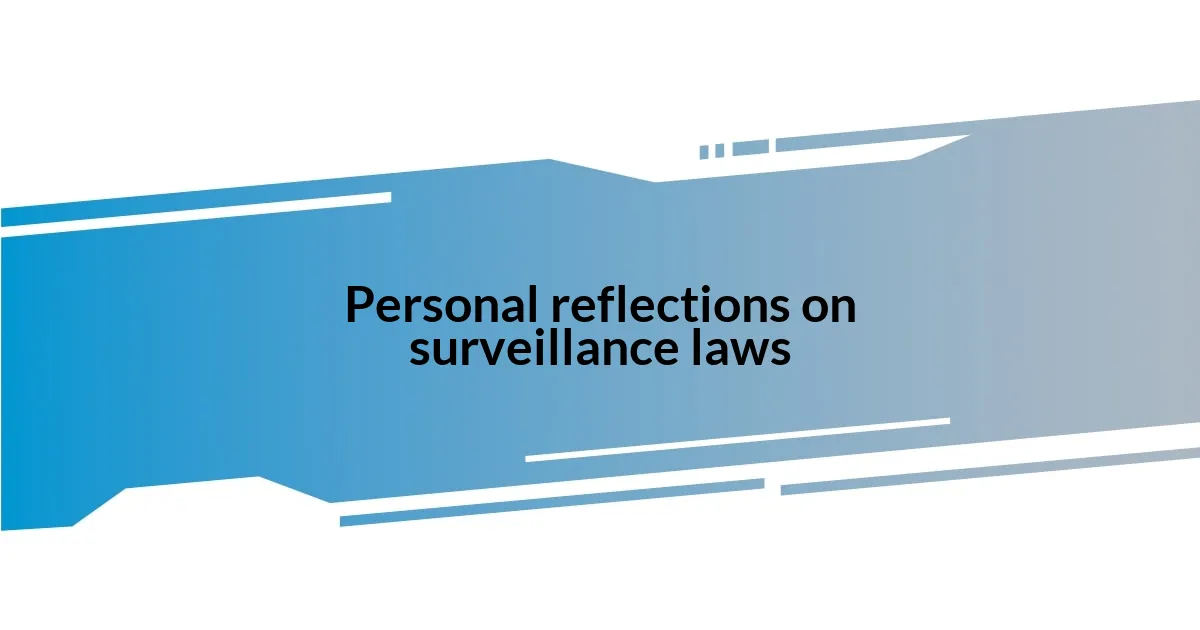
Personal reflections on surveillance laws
Reflecting on surveillance laws, I’ve often found myself grappling with a mix of curiosity and unease. There was a moment during a casual discussion with my family when I suddenly realized how accustomed we’ve become to our devices listening in on us. I remember nervously chuckling after a conversation about camping gear led to a flood of targeted ads for tents. It made me question not only our privacy but also how deeply integrated surveillance is in our daily lives. Have you ever felt that chill when your personal chats seem to echo back in ads?
One experience stays with me—the time I signed up for a new fitness app. I was excited, but it took a peculiar turn when the app requested access to my location and contacts. I hesitated, pondering the implications. My instinct screamed to safeguard my data, but then I was struck by a conflict: Was my desire for fitness community connection overshadowing my privacy concerns? It’s moments like these that compel me to pause and consider the balance between convenience and protection.
As I read more about surveillance laws, I felt a rising wave of responsibility wash over me. I distinctly recall a workshop I attended on digital privacy, and the speaker’s words resonated profoundly: “Knowledge is the first step toward empowerment.” I left that session with a renewed sense of agency, realizing that by understanding these laws, I could make informed decisions about my online presence. Have you ever walked away from a conversation feeling like you suddenly had control over your choices? That’s the power of awareness, and I actively strive to keep it in my daily life.